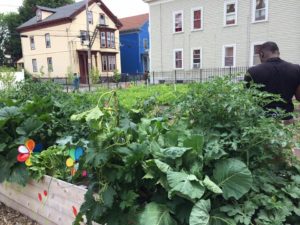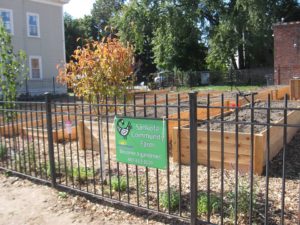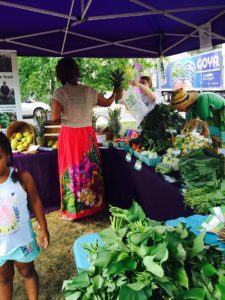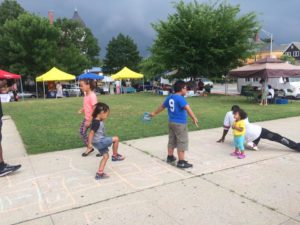 The National Civic League is proud to announce the winners of this year’s Health Equity Award: Angela Bannerman Ankoma and Sharon Conard Wells, of the Sankofa Initiative in Providence, RI.
The National Civic League is proud to announce the winners of this year’s Health Equity Award: Angela Bannerman Ankoma and Sharon Conard Wells, of the Sankofa Initiative in Providence, RI.
The Health Equity Award is presented each year by the National Civic League in conjunction with the Robert Wood Johnson Foundation to recognize individuals who are leveraging civic engagement to improve health outcomes for those most impacted by health disparities. Click here for more information on the award.
The Sankofa Community Initiative is a unique urban agricultural project integrating food production and economic development with high-quality, stable affordable housing for the sizeable refugee and immigrant population of Providence, Rhode Island.
Sankofa (a Ghanaian Akan word meaning “to return to your roots”) was developed in response to honoring the rich cultural background of Providence’s West End Community, one of the most racially and ethnically diverse neighborhoods in the city. The term sankofa is fitting as many residents have immigrant roots and Mrs. Ankoma helped spearhead the work after returning to her roots, moving back to the neighborhood in which she’d grown up.
Sankofa would become a multi-pronged approached which responded to the housing, public safety, community environment, income, quality of life and most importantly pride in the West End community.
 Upon returning to her childhood neighborhood, Ankoma a public health professional was struck by how poor health outcomes were for local residents. In looking for ways to help build a healthier community she connected with Sharon Conard Wells, Executive Director of West Elmwood Housing (pictured left). Soon after meeting, the women along with other residents and stakeholder discussed upcoming plans to redevelop 11 vacant lots in the West End neighborhood. The lots were a huge eye sore in the community and consistently attracted dumping, prostitution and crime. Initially, WEH had planned to convert the lots into town houses, but the economic downturn scuttled those efforts. Through conversation, the two women, among others, decided instead to transform the vacant lots into a combination of both housing to meet the perpetual housing demand and also include gardens as component to address the food access and health needs in the community and to improve the community environment.
Upon returning to her childhood neighborhood, Ankoma a public health professional was struck by how poor health outcomes were for local residents. In looking for ways to help build a healthier community she connected with Sharon Conard Wells, Executive Director of West Elmwood Housing (pictured left). Soon after meeting, the women along with other residents and stakeholder discussed upcoming plans to redevelop 11 vacant lots in the West End neighborhood. The lots were a huge eye sore in the community and consistently attracted dumping, prostitution and crime. Initially, WEH had planned to convert the lots into town houses, but the economic downturn scuttled those efforts. Through conversation, the two women, among others, decided instead to transform the vacant lots into a combination of both housing to meet the perpetual housing demand and also include gardens as component to address the food access and health needs in the community and to improve the community environment.
The Sankofa Community Initiative is a unique urban agricultural project integrating food production and economic development with high-quality, stable affordable housing for the sizeable refugee and immigrant population of Providence, Rhode Island. Prior to the Sankofa Initiative, housing development projects did not include gardening plots to residents in the building, housing plans did not include a plot for an urban farm and greenhouse to extend the growing season for residents. (Before photo pictured right.)
- The Sankofa Community Initiative includes four components:
- Sankofa Housing, consisting of 50 units of affordable 1- 2- an 3-bedroom rental apartments
- Sankofa Farm, land surrounded by the Housing and set aside for community agricultural use; and
- Sankofa Market, opportunity for residents who either had a small businesses or gardens to sell culturally appropriate and affordable foods to other refugees, immigrants and the larger population of Providence. The weekly market has become a destination for families during the summer to meet up with neighbors and also to provide a venue for people outside the neighborhood to purchase culturally diverse vegetables, prepared foods and other items native to the cultures reflected in the neighborhood.
- Sankofa WIC (Women Infants & Children) Center, which officially opened in February 2018, has already grown to serve over 100 clients in the community.
This multi-faceted project addresses many issues:
- It tackles blight by developing affordable housing and agricultural space on underutilized property;
- Deals with food scarcity by encouraging the growth and consumption of healthy, culturally relevant produce; and
- Helps the economy by giving residents the opportunity to sell what they grow and use other entrepreneurial skills to improve family wealth.
- It does all of this on a scale that has the capacity to produce systemic, long-term growth by improving the health, housing and economic opportunities of West End’s residents.
 The Sankofa Initiative led by resident champion (Angela Ankoma) and community development partner, Sharon Conard-Wells of West Elmwood Housing has not only created a culture of health in the West End Community, it has created a culture of prosperity and neighborhood pride. The Sankofa Initiative as altered 11 blighted properties and drawn over $15-million dollars of community development investment in one of the poorest neighborhoods in Providence. The Sankofa tackled root causes of health inequalities (poor housing, lack of culturally responsive food access, crime and economics) to achieve health equity for members of the West End community.
The Sankofa Initiative led by resident champion (Angela Ankoma) and community development partner, Sharon Conard-Wells of West Elmwood Housing has not only created a culture of health in the West End Community, it has created a culture of prosperity and neighborhood pride. The Sankofa Initiative as altered 11 blighted properties and drawn over $15-million dollars of community development investment in one of the poorest neighborhoods in Providence. The Sankofa tackled root causes of health inequalities (poor housing, lack of culturally responsive food access, crime and economics) to achieve health equity for members of the West End community.
As impressive as the changes to the physical community, the changes in community perception, trust and pride are just as remarkable. Sankofa is more than a good idea or innovative project erected in a specific place – it is an approach that grew out of conversation with residents and which reflects the local needs, culture and passions of West End residents. From the very start, Sankofa’s efforts were rooted in the community. In 2011, upon the development of the Sankofa Initiative concept, members of the Sankofa committee began conducting a community needs assessment. This included key informant interviews and neighborhood intercept interviews with residents of the neighborhood. Interviews were conducted in multiple languages, in varying locations from neighborhood parks, local businesses, to door to door surveys. Sankofa utilized data gathered from the neighborhood, to shape the project and build capacity for ongoing engagement. Since 2011, the project has hosted more than 2 dozen community forums, focus groups, and a community food assessment.
The community food assessment – one of the most comprehensive in the state – helped Sankofa (and others):
- Understand local food systems
- Inform the setting of goals to improve local food systems
- Inform decision-making about policies and actions to improve community food security
- Establish a long-term monitoring system with a clear set of indicators
Taken together this work led to the West End Food Security Plan. The plan seeks to:
- Develop the West End’s neighborhood economy to support increased incomes and family financial security;
- Increase access to healthy food;
- Build supportive neighbor-to-neighbor connections; and
- Expand residents’ understanding of nutrition and food systems through culturally relevant education.
 This way of working has systemically changed the types of housing projects that are funded by the state housing agencies. The efforts of West Elmwood Housing in partnership with the local community refocused the local food industries previous emphasis on “teaching” diverse populations to eat healthier to increasing access to culturally familiar food as a means of food access.
This way of working has systemically changed the types of housing projects that are funded by the state housing agencies. The efforts of West Elmwood Housing in partnership with the local community refocused the local food industries previous emphasis on “teaching” diverse populations to eat healthier to increasing access to culturally familiar food as a means of food access.
Community members have been engaged, informed and have led the Sankofa Initiative project from concept to vision to implementation. As Angela says,
We shifted the paradigm of going into communities with preconceived notion that residents don’t have the knowledge about what the needs are in their community. The Sankofa Initiative is the community voice that has come to life. Residents feel ownership of the successes of the effort because we worked together. When key decision makers were hesitant to provide the funding needed for the initiative, it was residents who directly approached elected officials and funders to advocate.
That inclusion and involvement has not only built a culture of health but also build a model of grassroots community mobilization that has extended beyond housing to local policy advocacy and engagement. Community members have collaborated to form a neighborhood group (Neighbors for Revitalization) to actively engage city leadership, businesses, investors on housing and quality of life decisions. Community members witnessed how thorough and engaged they were on the Sankofa Initiative and now expect the same level of transparency and engagement. Neighbors for Revitalization has already been very successful in several community efforts that further empowered residents. The impact of the Sankofa Initiative has extended far beyond the housing development project.
About the National Civic League and the Robert Wood Johnson Foundation Health Equity Award:
The mission of the National Civic League is to advance civic engagement to create equitable, thriving communities.
National Civic League believes that to achieve health equity we must the challenges, aspirations, barriers and realities of the community. To share the example of innovative approaches to equity and shine a light on leaders across this country, the League has partnered with the Robert Wood Johnson Foundation.
Together with the Robert Wood Johnson Foundation, National Civic League is recognizing, celebrating and rewarding individuals who are making health equity a reality in their community. The RWJF-National Civic League Health Equity Award recognizes individuals who are leveraging engagement to improve health outcomes for those most impacted by health disparities.



